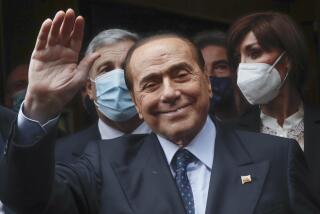EUROPE : Italy’s ‘Clean Hands’ Inquiry Gets Sullied
- Share via
ROME — It started three years ago as an investigation into a payoff in Milan and mushroomed into democratic Italy’s greatest scandal, toppling like dominoes slick politicians and entrenched parties that had ruled the country for half a century.
Now, to the jeers of an increasingly cynical electorate, the investigation called “Clean Hands” has turned on itself in a political free-for-all that is sullying judges once hailed as heroes and exposing flaws in the national justice system.
“After the spring of the investigations comes the darkness of vendettas,” observed former judge Antonio Di Pietro recently with sadness.
Di Pietro, not long ago the most popular figure in Italy, is now a private citizen defending his tarnished reputation against critics who contend that a private loan he accepted--since repaid--was questionable and that he failed to pursue an investigation involving former and would-be Prime Minister Silvio Berlusconi.
The spearhead of Clean Hands investigations into kickbacks to politicians and parties for public contracts, Di Pietro quit as an investigating magistrate in December, citing political pressures he said had made his job impossible.
Since then, mud and sensationalism have splattered in all directions as the political left and right have exploited Clean Hands for their own advantage with an eye toward national elections likely in the fall.
*
Are powerful right-wing forces trying to undermine Clean Hands by discrediting the magistrates? Have the magistrates abused their right of preventive detention? Did they intimidate inspectors sent by the Justice Ministry to find out? Is there proof to convict in court all those already condemned by public opinion?
“When somebody has been massacred all over Page One, who sews him back together?” asked President Oscar Luigi Scalfaro this week in an appeal for less justice-as-spectacle.
Although new corruption arrests are being made--there were dozens last week in Naples--the momentum of the investigation has slowed and its bite has weakened. Partisan politics and a creaky and overburdened justice system have sapped strength from Clean Hands and fueled popular disillusion.
More than 3,000 political figures and business leaders have been implicated in the payoffs that became institutionalized during decades when a handful of power-sharing centrist and moderate leftist parties swapped contracts for cash.
About 700 cases have been sent to trial. There have been nearly a dozen suicides and some spectacular flights from justice: Former Prime Minister Bettino Craxi, sentenced to eight years for corruption, is living in exile in Tunisia.
No political party and not many major companies have escaped unscathed. Last week, the managing director of Fiat was questioned for eight hours, and Berlusconi himself, like his brother Paolo, is under indictment for alleged payoffs to tax inspectors by their Fininvest media empire. Berlusconi says the company was a victim of extortion by the inspectors and that he is being targeted in a political witch hunt.
For all the furor, though, nobody is yet in prison after being convicted in court. Walter Armanini, the former Milan cemetery commissioner, is serving five years after a plea bargain and complains that he is lonely.
“There are thousands of other guilty people out there. Where are they?” Armanini asks.
*
Inequities in the Clean Hands prosecution have fueled national debate both on the need to overhaul the justice system and on the practice of preventive detention.
In Italy, suspects may now be held without bail to await a trial that may be years away: 46% of all Italian prisoners are being preventively detained, either in jail or under house arrest. Laws awaiting parliamentary approval would reduce the scope of preventive detention.
“We must be careful to balance the defense of society and guarantees of individual rights,” cautioned Giancarlo Caselli, chief judge in Palermo.
But Clean Hands’ greatest contribution may already have been made. By exposing corrupt power-mongering, it triggered the disintegration of mainline parties that lived off the practice, clearing the way for a reformed political system.
Thus, even if the flawed process bogs down entirely, its defenders say that Italians have benefited from Clean Hands as heirs to a moral overhaul that can only benefit their nation’s long-term credibility as a modern democracy.
More to Read
Sign up for Essential California
The most important California stories and recommendations in your inbox every morning.
You may occasionally receive promotional content from the Los Angeles Times.










